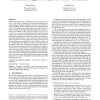Free Online Productivity Tools
i2Speak
i2Symbol
i2OCR
iTex2Img
iWeb2Print
iWeb2Shot
i2Type
iPdf2Split
iPdf2Merge
i2Bopomofo
i2Arabic
i2Style
i2Image
i2PDF
iLatex2Rtf
Sci2ools
156
click to vote
ASPLOS
2012
ACM
2012
ACM
Architectural support for hypervisor-secure virtualization
Virtualization has become a standard part of many computer systems. A key part of virtualization is the all-powerful hypervisor which manages the physical platform and can access all of its resources, including memory assigned to the guest virtual machines (VMs). Continuing releases of bug reports and exploits in the virtualization software show that defending the hypervisor against attacks is very difficult. In this work, we present hypervisor-secure virtualization – a new research direction with the goal of protecting the guest VMs from an untrusted hypervisor. We also present the HyperWall architecture which achieves hypervisor-secure virtualization, using hardware to provide the protections. HyperWall allows a hypervisor to freely manage the memory, processor cores and other resources of a platform. Yet once VMs are created, our new Confidentiality and Integrity Protection (CIP) tables protect the memory of the guest VMs from accesses by the hypervisor or by DMA, depending on ...
Related Content
| Added | 20 Apr 2012 |
| Updated | 20 Apr 2012 |
| Type | Journal |
| Year | 2012 |
| Where | ASPLOS |
| Authors | Jakub Szefer, Ruby B. Lee |
Comments (0)

